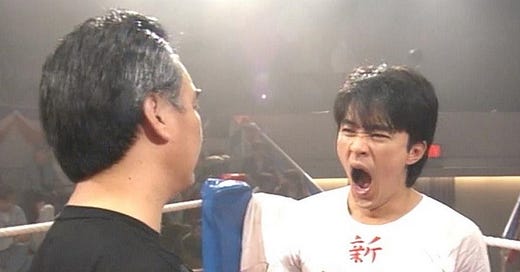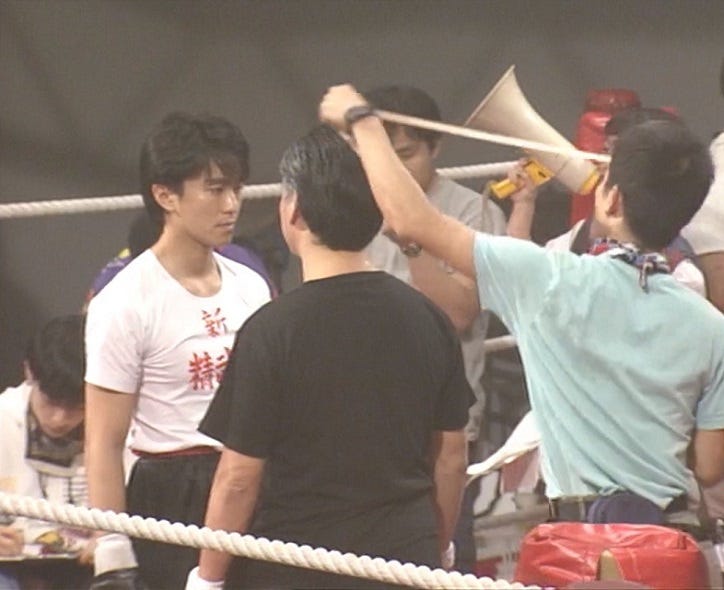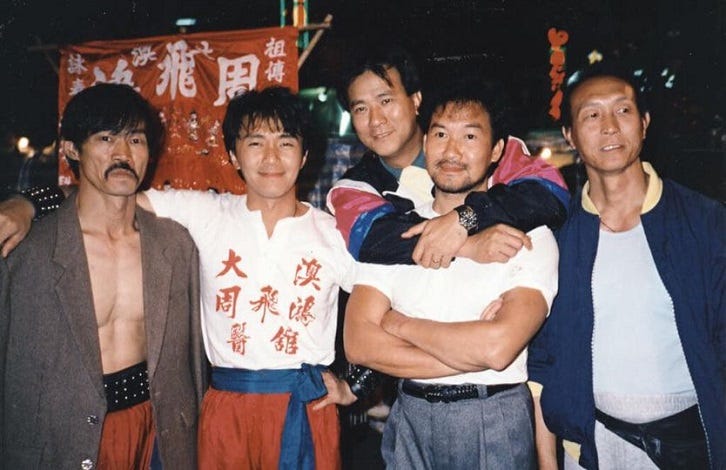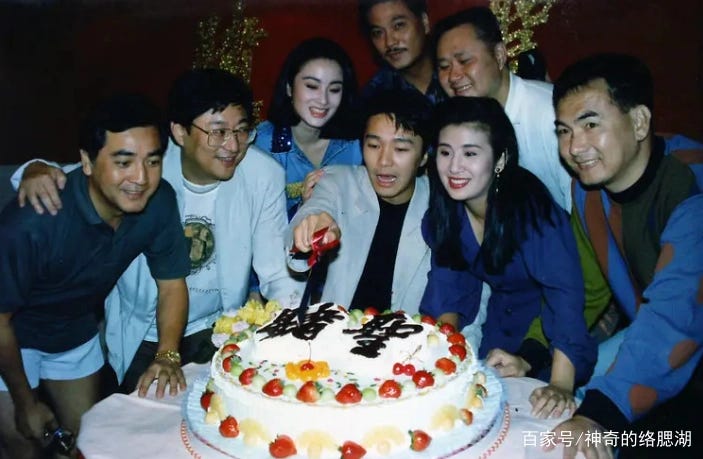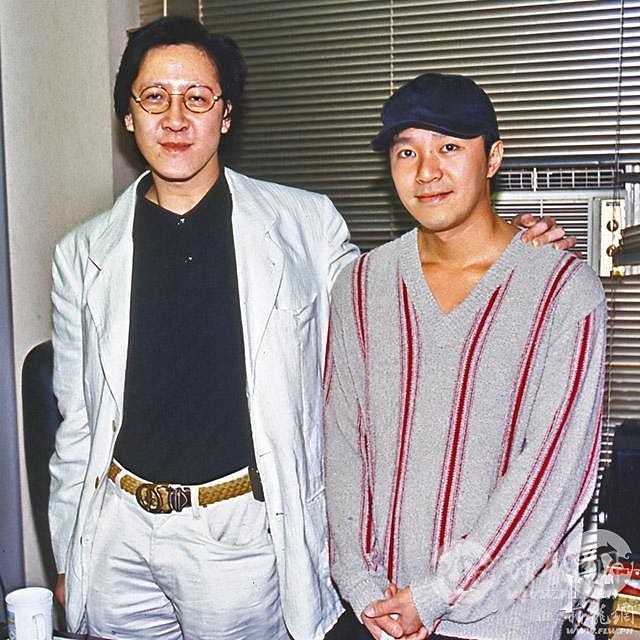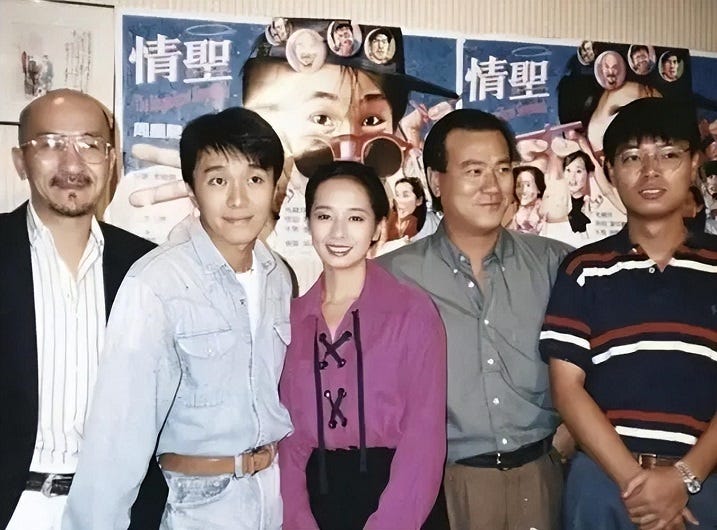Both words share the same Latin origin: apprehendere. In his ridiculously prolific film career, Stephen Chow has served several masters many times over. The above video freeze-frame was taken from the making of Fist of Fury 1991 - this was one of many movies that Stephen was acting in circa 1991. In an episode of a TVB news series about the Hong Kong film industry, producer and fight choreographer Corey Yuen Kwai (seen above) explained that the original budget for the movie was HK$10 million but the cost rose to 15 million due to shooting overtime. Corey had also pointed out that post-production for each new movie usually takes one month, but the time for that spent on Fist of Fury 1991 was greatly reduced due to the Easter deadline i.e. March 31 but the film was released in H.K. cinemas on March 23. In 1991, Stephen Chow could be seen in eight films and heard as a narrator in another one.
Another collaboration between Stephen and Corey Yuen was Legend of the Dragon, which was released on March 7. In early April 1991, filming began on Lucas Lo’s American Shaolin where Corey wanted to redo a ring fight that he attempted to do in Fist of Fury 1991. This would suggest creative differences, which makes sense since Corey would do one more movie with Stephen - Fist of Fury 1991 II (which was released on New Year’s Day in 1992). One of the producers and screenwriters for the Fist of Fury 1991 duology was Jeff Lau, who worked many times with Stephen and Corey over the years but mostly as a duo than a trio. In one of the deleted scenes in American Shaolin (which was produced by Ng See-Yuen), the white protagonist was established in his hometown as a Bruce Lee fan.
Corey Yuen was one of the stuntmen in Bruce’s Fist of Fury (made in 1971 but released in 1972), which makes Corey’s tragicomic performance in Fist of Fury 1991 all the more endearing. Quite fitting since Fist of Fury was the only Bruce Lee movie that Corey appeared in. He wasn’t even in Enter the Dragon (1973). Corey was the perfect choice for the role of fight choreographer when you look at the movies that he previously worked on that were influenced by Bruce Lee - Tower of Death (1981), Ninja in the Dragon’s Den (1982), No Retreat, No Surrender (1985) and Bruce Lee and I (1976). The latter starred Danny Lee - the director and producer of Stephen Chow’s Legend of the Dragon (1991), which features British snooker player Jimmy White.
Back to Danny Lee, he is the one hugging Leung Kar-Yan during the making of the movie. Although Stephen was established on TV, it was Danny who initiated him in the world of film. In 1988, Danny had signed Stephen to a ten picture deal for his company, Magnum, but the record-breaking success of Seasonal’s All for the Winner (1990) meant that Danny had to eventually sell his contract to the Win’s company because too many Triads wanted to work with Stephen. It didn’t help that Danny and Stephen had creative differences. Danny only loaned him out to Seasonal because his first three movies with Stephen were not as successful as he would have liked, although Stephen won a Golden Horse Award in Taiwan for best supporting actor because of his performance in Final Justice (1988). Following the smash hit success of Jeff Lau’s All for the Winner, Danny Lee was able to produce two 1991 films starring Stephen (Legend of the Dragon and The Magnificent Scoundrels) before he had to let him go. The stunt coordinator for these two films was Corey Yuen.
If it wasn’t for Ng See-Yuen hiring him to action direct Stephen Chow’s All for the Winner, Corey would probably have worked with Jet Li on Tsui Hark’s The Master. This began filming in late 1989 until Jet broke his wrist in December, tried to continue filming with the forearm cast covered then filming stopped before it picked up again in late spring 1990. Jerry Trimble remembered that it was only after moving to Los Angeles in March 1990 that he was cast in both The Master and Breathing Fire, which were filmed at the same time. In March, Jerry also appeared in one scene that was filmed for Ng See-Yuen’s The King of the Kickboxers where Billy Blanks played the villain. Billy had a cameo in The Master. Although Jerry and Billy appeared in both movies, the one scene that Corey Yuen was hired for The King of the Kickboxers is one that centers around an actor who didn’t appear in The Master - Keith Cooke. Since Stephen Chow could speak English and had already worked in America for a Hong Kong movie called Dragon Fight (1989), Seasonal founder Ng See-Yuen could have greenlit an English language film for Stephen.
The next movie that Ng produced with Stephen Chow in it was one where Stephen was one of many stars. It was a charity relief production co-directed by Tsui Hark, and it was titled The Banquet (1991). After the death of Jet Li’s manager, Stephen never worked for Ng again. As for the Fist of Fury 1991 duology, they were not produced by Seasonal. They were produced by a company called Chun Sing. This was founded by Eddie Wong Chin-Yik (this is his Cantonese name but his Mandarin name is Huang Zhanyi). This martial artist is one of the bosses for the 14K Triad - the same one that Michael Chan Wai-Man leads. This is important to note because Michael is a friend of Eddie, and he co-starred alongside Stephen in a 1990 movie (Unmatchable Match) that was made for Danny Lee’s Magnum film company. This was released three months before All for the Winner made Stephen an A-lister in the Hong Kong film world. Stephen complained that he was still being paid HK$700,000 per film despite being Hong Kong’s number one movie star, but Danny’s take on it was that the box office success compensated for what he saw as previously underperforming films.
It was only when All’s Well, End’s Well was greenlighted in 1991 that Stephen was paid a pricey sum i.e. HK$8 million by actor/producer Raymond Wong Pak-Ming. This writer and songwriter was so grateful for the record-setting success of All’s Well, End’s Well in 1992 that he paid Stephen HK$15 million for the sequel that was made in 1996. The aforementioned Leung Kar-Yan directed Stephen in a Chun Sing production called My Hero. This was released in March 1990 - five months before the release of All for the Winner. Because Chun Sing’s founder, Eddie Wong, was a martial artist like Michael Chan Wai-Man, they were the bodyguards of a casino tycoon named Stanley Ho. In 1991, Wong Jing made a film about Stanley called Casino Tycoon. In 1991, Stanley was photographed dancing with Jet Li’s girlfriend, Nina Li Chi, at a gala. Jet and Nina had acted with Stephen Chow in a 1989 movie titled Dragon Fight. Despite the prestige of the 14K Triad’s association with Stanley Ho, Stephen would ultimately become longer contracted to the boss of the Sun Yee On Triad - Jimmy Heung (the below founder of the Win’s company).
Stephen was no stranger to the Sun Yee On Triad. One of their other film companies, Grand March, had produced Dragon Fight. It was filmed in California, where Jet was living at the time. The Sun Yee On could lay stake to the claim that if it wasn’t for them, Jet would never have met his girlfriend - Nina Li Chi. Also released in 1989 was another America-set movie by the Sun Yee On, Wong Jing’s Casino Raiders (which was produced by Win’s). How Stephen came to be in Dragon Fight involves his mentor, Danny Lee. The latter’s Magnum company was producing a John Woo film, Just Heroes, with the help of Tsui Hark. It was a charity project designed to fund the retirement of Danny’s mentor, Chang Cheh (who was also John Woo’s mentor at the Shaw Brothers film company). Although most of the cast were going to be old school veterans, Stephen insisted to be in the film because he had always been eager to collaborate with fellow Wing Chun practitioner Ti Lung.
Director Billy Tang, however, wanted Stephen to be in Dragon Fight instead. Danny Lee couldn’t resist loaning Stephen out, so Stephen received a phone call from him about Just Heroes while filming of Dragon Fight was well underway in San Francisco. Making matters worse was that Stephen agreed to co-star in a TV series, The Justice of Life, starring his other mentor: Alex Man. After Alex learned about the difficulties faced by Stephen, he took the initiative to postpone the taping of the series to November 1989. The production of Just Heroes also made appropriate schedule adjustments. Billy Tang let Stephen go only because it would help sell his own movie. Stephen is not so lucky that he just about found the time to be in the least classic of John Woo’s ‘80s H.K. action films. This was released in the same month as Dragon Fight - September 1989. As for the Win’s company, Stephen signed with them in 1991 whereas Jet Li signed with them in 1992.
The man on the far right is Lee Lik-Chi. He was the director and co-writer of a film that marked the final production of Cinema City, co-owned by the man on the far left: Karl Maka. Danny Lee thought that getting Magnum to co-produce The Magnificent Scoundrels would pay dividends, but the local box office was only HK$16 million. Lee Lik-Chi regarded Danny as his benefactor, and was grateful about having previously worked as a co-director on Legend of the Dragon. He would work with Stephen Chow many times. Stephen is also grateful to Danny, as is actor Nick Cheung. Danny wanted to be a policeman before he became an actor whereas Nick actually was a policeman before he became an actor. Nick was signed to Magnum, but it took a long time for him to be cast as a Stephen Chow clone in comedies. When he finally was, he was directed by one of Stephen’s main directors: Wong Jing.

